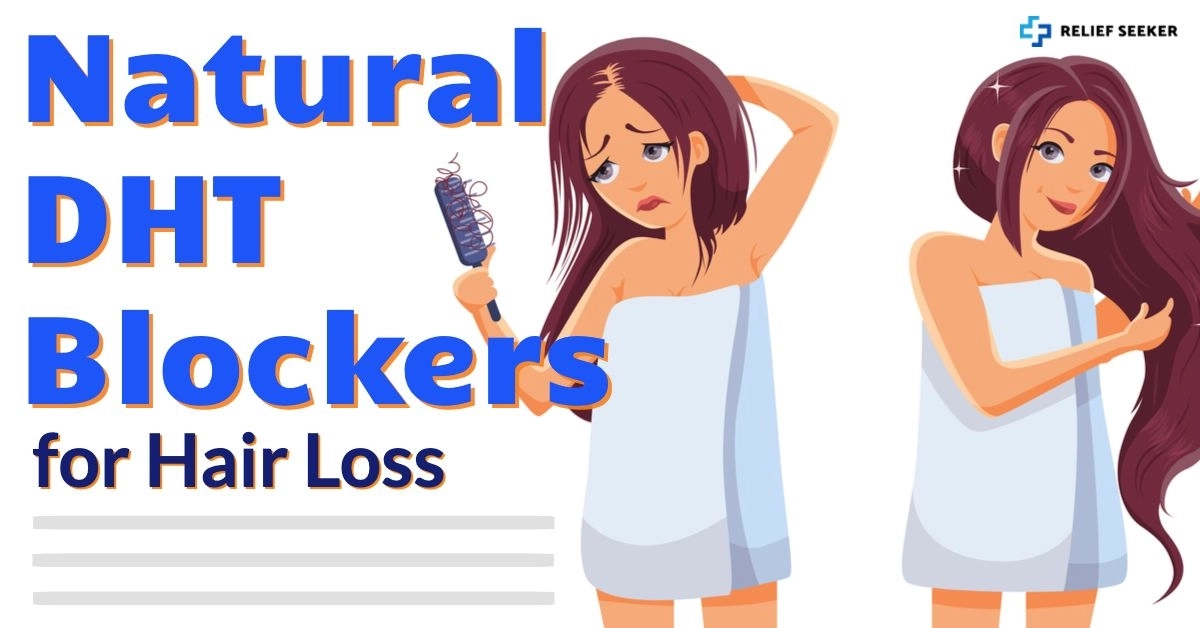Dihydrotestosterone (DHT) is a naturally occurring hormone in the body.
This hormone is in charge of the growth of body hair and is formed by testosterone. Essentially, DHT is responsible for creating many male attributes that society considers ‘manly’, such as a low voice, male genital growth, and muscle mass and fat storage. Yet, DHT can also be to blame for ‘less desirable’ issues, such as head hair loss (also known as androgenetic alopecia and male pattern baldness, though balding and hair thinning can affect both men and women).
One way to prevent hair loss is to block DHT levels in the form of a DHT blocker. These blockers are available via a doctor’s prescription but are also found naturally in some substances (such as caffeine and green tea).
Yet how effective are natural DHT blockers? Can they safely and effectively prevent hair loss?
Find out if natural DHT blockers are as effective as prescription DHT blockers, where to find them, and how to to use them.
DHT and Hair Loss
What does DHT have to do with hair loss? DHT is a hormone that is created by testosterone.
This hormone is present in both male and female bodies. Women generally don’t have as much testosterone as men (and thus less DHT), so they don’t experience DHT-related hair loss as often.
While DHT is an important hormone, it does cause hair loss. Obviously, one way to address DHT-related hair loss would be to simply block the DHT from binding to 5-AR receptors in the hair follicles.
Prescription DHT Blockers Vs Natural DHT Blockers
Generally speaking, there are two types of DHT blockers: natural and prescription-strength.
Natural DHT blockers are found in food, herbs, vitamins, and other natural ingredients that are considered ‘household items’.
Prescription-strength DHT blockers are available by prescription only (as their name suggests). These DHT blockers contain 1 mg of finasteride, a generic drug that was originally developed as a prostate enlargement medication.
The biggest difference between natural and prescription DHT blockers is the research behind each one when used as a hair loss treatment. While natural DHT blockers are considered less expensive and easier to access (you obviously don’t need a prescription for green tea!), there haven’t been enough clinical studies that show these ingredients are as effective as prescription DHT blockers. If you want to compare at-home hair loss treatment options check out our analysis of Roman vs. Hims vs. Keeps.
How Effective Are Natural DHT Blockers?
Natural DHT blockers are considered somewhat effective (depending on the type of natural DHT blocker you’re talking about).
Some natural DHT blockers are more effective than others. Very few natural DHT blockers have been studied in a clinical setting for efficacy, and there’s also very little anecdotal evidence to support the efficacy of these ingredients as hair loss treatments.
That being said, some patients have found that taking natural supplements to treat their hair loss, receding hairlines, and thinning hair, have experienced a slowing of hair loss.
Basically, if natural DHT blockers work, you should definitely keep using them — as long as your doctor has given you the green light to do so (and as long as you’re aware of the possible side effects or interactions with current medication).
Natural DHT Blocker Benefits
Natural DHT blockers do offer some benefits when it comes to slowing or stopping hair loss. It’s important to note that most DHT blockers (natural or prescription-strength) won’t help regrow your hair or grow new hair; they simply prevent more hair loss from occurring.
Natural DHT blockers generally have all-natural ingredients, don’t require a prescription, and show gentler results.
All Natural Ingredients
Natural DHT blockers generally contain ‘all-natural’ ingredients, meaning they are not created in a lab and are found in nature.
Most natural treatments are vitamins, herbs, supplements, or essential oils. You’re more likely to recognize the ingredients of these treatments and you’re more likely to find them without a prescription.
You may even be able to find an all-natural remedy in the form of a food or plant item at the grocery store. The most common natural DHT blockers include:
Biotin
Caffeine
Green tea
Lycopene
Pumpkin seed oil
Pygeum
Rosemary oil
Saw palmetto
Stinging nettle
Vitamin B12
Vitamin B6
No Prescription Necessary
You generally don’t need a prescription to get your hands on pumpkin seed oil, B12, or stinging nettle. This means that it’s easier (in some ways) to access natural remedies than it is to get a prescription for a DHT blocker.
Yet, many prescriptions for DHT blockers are now available through men’s telehealth platforms, meaning you can get a prescription from the comfort of your own home — making getting a prescription for a DHT blocker just as easy as ordering rosemary oil off the internet.
Many patients also assume that natural alternatives to prescriptions are also automatically much more cost-effective — which isn’t always the case. Vitamins and oils can cost upwards of $10 a bottle, while prescription DHT blockers (generic finasteride) start at about $20 for a three-month supply.
Gentler Dosages
Patients searching for all-natural alternatives to prescription medications are often seeking gentler dosages. They’re worried about side effects or of taking too many prescription drugs.
Since natural DHT blockers are generally found in food and don’t require a prescription, the dosage is often considered ‘gentler’ than that of a prescription. Of course, the downside to all-natural alternatives is that the dosages aren’t regulated for a specific purpose.
You’ll still need to talk to your doctor before starting an all-natural regimen. Some products can’t be taken with current medication or can cause their own adverse side effects or reactions, so you’ll want to get the all-clear with a doctor before taking them. You’ll also want to chat with your doctor about the correct dosage of a natural remedy.
Natural DHT Blocker Downsides
We love that natural DHT blockers offer a low-cost and natural alternative to hair loss medications; yet, these remedies aren’t perfect and should only be taken under doctor supervision. Some of the downsides of natural DHT blockers are that they aren’t as effective as treating hair loss, they may cause other health issues, and there’s little research to provide proof of actually treating hair loss.
Not As Effective in Treating Hair Loss
All-natural remedies (including natural DHT blockers) are often unregulated and aren’t offered in doses specific to each condition. Essentially, pumpkin oil, green tea, and biotin are sold to treat a long list of issues, ranging from memory issues to lowering cholesterol.
This also means that you may not be able to get the correct dosage or usage instructions for your particular condition (especially since doctors don’t generally prescribe natural remedies).
There aren’t enough studies to validate the claims made by manufacturers of natural remedies, and much of the evidence that natural DHT blockers slow or stop hair loss is anecdotal.
Natural Remedies May Cause Health Issues
Since there aren’t many studies substantiating health claims made by manufacturers of natural remedies, we don’t often fully understand the side effects or health issues associated with these treatments.
There are also some known side effects of some of these remedies; green tea has been known to cause gastrointestinal issues, such as constipation and stomach pain in some patients. In rarer cases, it may cause kidney and liver damage.
Many natural remedies can also interact with medications, so it’s important to always talk to your doctor before treating your symptoms with natural DHT blockers.
Not Enough Research to Validate Claims
While there is some clinical research to validate the positive benefits of some of the natural DHT blockers on this list, there isn’t enough research to substantiate the claims that these ingredients can effectively slow or stop hair loss.
The other major downside to using natural DHT blockers is that your doctor probably won’t ‘prescribe’ them to you, meaning you may not be able to take them under doctor supervision. This is why it’s important to always talk to your doctor before taking natural remedies. You always want to start a regimen under doctor supervision to monitor possible side effects or interactions.
Prescription DHT Blockers
The good news is that there are a few prescription options available, too. Most of these drugs are easily accessible, affordable, and convenient. You can talk to your doctor about getting a prescription for Propecia or generic finasteride.
Finasteride is a 5-alpha-reductase inhibitor that was initially approved by the FDA to treat an enlarged prostate.
Or, you can always chat with a doctor at an online digital clinic such as Keeps or Roman and get your finasteride prescription mailed directly to your home or office.
Both Propecia and finasteride are the same medications (Propecia is simply a 1 mg dose of finasteride).
Of course, there are some side effects associated with finasteride, too. If you have a history of impotence, you should talk to your doctor before starting this medication.
DHT Blocker Alternatives for Hair Loss
Finasteride and Propecia both to combat hair loss and are known to stop or slow hair loss in clinical trials. Known as anti-hair loss products, what DHT blockers may not do is regrow the hair you’ve already lost.
If you want hair regrowth or new hair growth, you may need to get a prescription for minoxidil (otherwise known as generic Rogaine).
Minoxidil can be taken either orally or topically. You’ll find it as the active ingredients in hair care products, such as DHT blocker shampoo and conditioner.
It’s available through a doctor’s prescription or an online digital clinic such as Roman or Keeps. Some digital clinics even offer a discount when you purchase both products together.
Like with any medication (prescription or ‘all-natural’), minoxidil may cause some side effects, such as swelling, irritation, and burning scalp (for its topical version).
Best Natural DHT Blockers
As long as your doctor gives you the green light to use natural remedies, you may want to check out a few of the below natural DHT blockers. Many of these products are known to promote healthy hair, and there’s enough anecdotal evidence of the efficacy of some natural remedies (especially when used in conjunction with other hair thinning and hair loss products) to make trying a few worth your time and money.
Biotin
Biotin is a coenzyme that is also known as vitamin H. It’s found naturally in bananas and eggs. There’s at least one study that suggests taking biotin supplements for several months may help increase hair volume.
It’s important to talk to your doctor before taking this product, as it may alter the results of blood tests.
Caffeine
Caffeine is one of the most common natural remedies, and this drug is known to treat a huge list of conditions. There’s some research that suggests that caffeine may help promote hair growth (especially when taken in conjunction with prescription hair loss medications).
Green Tea
Green tea is another ingredient/drug that is commonly used as a natural remedy. This ingredient is often found as a tea itself, in capsule form, or as green tea extract, an essential oil. It contains epigallocatechin-3 gallate (EGCG), which is an antioxidant that might prevent testosterone from being transformed into DHT. Some studies suggest this, but more research needs to be performed to confirm this hypothesis.
Lycopene
This antioxidant may help regulate DHT levels, but it also may be linked to further hair loss, so you may want to check with your doctor before trying this supplement.
Pumpkin Seed Oil
In one study, pumpkin seed oil increased hair growth by 40% of participants. The biggest downsides are that research is still limited on the effects of this treatment, and some patients experience side effects such as stomach pain after taking pumpkin oil.
Pygeum
Pygeum (cherry tree bark) has been studied for its use to treat prostate enlargement (another side effect of DHT); yet, more research needs to be performed before giving it the green light to be used as a treatment for hair loss.
Rosemary Oil
Rosemary oil may be one of the possible best natural DHT blockers. In one small study, rosemary oil increased hair volume just as effectively as minoxidil. The only downside is that the study was so small (only about 50 participants) that it isn’t considered a ‘proven’ replacement for prescription hair loss treatments.
Saw Palmetto
Saw palmetto (the extract from palm trees) may also decrease male-pattern hair loss according to one study. The downside is that only 48% of participants noticed this decrease in hair loss, so its efficacy may not be strong enough for saw palmetto to be a viable treatment for this condition.
Stinging Nettle
Stinging nettle is another herb that may reduce prostate enlargement and other side effects of DHT; yet, this herb is also known to create intense side effects when it comes in contact with skin.
Vitamin B12 and B6
Some patients suffer from hair loss as the result of a B12 or B6 deficiency; if this is the case for you, we recommend talking to your doctor to find a supplement that can reverse the effects of this deficiency and get your nutrient levels back to normal.


